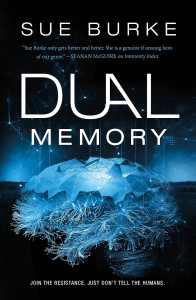 I haven’t yet read Sue Burke’s debut Semiosis, which recently received high praise from Jo Walton, who put it on her list of the Top Ten Genre Books of the First Quarter of the Century over at Reactor Mag. It was while looking for it at the local library that I came upon Burke’s latest, 2023’s Dual Memory, the only one of her four books on the shelf so I snatched it up. Glad I did.
I haven’t yet read Sue Burke’s debut Semiosis, which recently received high praise from Jo Walton, who put it on her list of the Top Ten Genre Books of the First Quarter of the Century over at Reactor Mag. It was while looking for it at the local library that I came upon Burke’s latest, 2023’s Dual Memory, the only one of her four books on the shelf so I snatched it up. Glad I did.
Dual Memory introduces us to two memorable characters, one human and one AI. It’s set sometime in the not too distant future on an Earth that’s been destabilized politically, economically and socially by climate change. The economic aspect of the story was foremost in Burke’s mind, as she reveals in her acknowledgments: “A series of what-ifs inspired by history led to this novel,” she says — the specific historical inspiration came from the Tulip Mania economic bubble in the Dutch Republic in the 1630s.
The story is told from the vantage points of its two main characters, in not-quite alternating chapters. Our human protagonist is Antonio, a refugee from South America who has washed up on the shores of a tiny Arctic island called Thule after the only “city” on it. Though he works sorting trash on a garbage scow, when we meet him he’s in the middle of a battle, helping some mercenaries repel a band of raiders attacking Thule. He’s badly injured and taken ashore, where he is treated by the Thules (THOO-lays), a neutral medical order that runs the city and island. In his delirium he is visited (perhaps in a hallucination) by the Bronzewing mercenaries’ leader, who charges him with rooting out raider sympathizers hiding on Thule.
Antonio isn’t just a trash sorter. He’s a visual artist. And even though he is functionally illiterate he has been able to take art and art history courses online, so he knows what he’s doing. When he gets out of the hospital he lands a job with one of Thule’s rich merchants to create their house’s entry in the annual art fair.
In between Antonio’s chapters we’ve also been introduced to Par, a companion AI in a handheld device that is not only sentient but capable of independent thought and action. Par is a quick learner and begins clandestinely to build relationships with all the other systems it meets as its owner carries it around Thule — buildings, vehicles, streets, tugboats, coffee machines, toys — all have some level of intelligence and gladly share what they know with the increasingly chatty Par, even if it’s only the weather forecast.
A grateful client off-handedly gives Par to Antonio, and our story takes off. Another invasion by the raiders is coming, but nobody knows when, and the elites care mostly about how to continue making money until it happens — but everyone else on Thule including the buildings fears another attack. Antonio, as a newcomer, has a steep learning curve as he tries to navigate his job, his increasingly complicated relationship with Par, and relationships with everyone from his doctors to his hostile coworkers to the city’s elites — most or all of whom are not what they seem.
Burke helpfully varies her writing style in the two characters’ chapters, with the semi-literate Antonio writing in first person past tense, using short simple words, brief declarative sentences, not too many adverbs or adjectives; and Par (in third person) growing ever more fancifully verbose, like a precocious tween who’s been gorging on Wikipedia and highly caffeinated lattes. Both story tracks are set against the backdrop of the latest fad, the trade in fossilized microscopic life forms brought back by probes from various of the Solar System’s planets, moons and asteroids.
Dual Memory is a tale of late stage capitalism continuing to run amok as the planet simmers, and refugees and raiders wash up on all shores, stressing humans and systems both built and natural. Burke has crafted a fast-paced, entertaining tale with likeable characters and a twisty, action filled plot. Not since The Gay Deceiver has an AI been so lovable and troubling at once. Burke takes a thread from Heinlein’s Number of the Beast and weaves a much more cogent tale with far less gratuitous sex and, well, zero incest. Chief takeaway: Always thank the machines.
(Tor, 2023)
